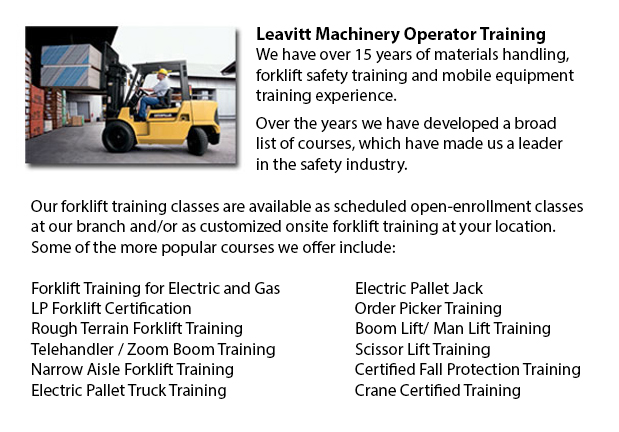
Forklift Certification Schools Moose Jaw - Forklift Certification is mandatory in North America. Hence, forklift training programs are necessary both for companies and for people looking for work in industries as forklift operators. Forklift training focuses on health and safety concerns included in forklift operation. Safety issues affect both the operator of the forklift and personnel and other individuals who are near the forklift. Businesses may be subject to penalties if they are caught with un-certified operators during a check up. There are several convincing reasons why businesses must follow forklift standards.
Before the employee or trainee is certified to operate a forklift, the majority of provincial, federal and state rules will require the employee undergo an evaluation of the skills needed for forklift safety. There are various forklift certification schools offering courses for workers and there are likewise schools that provide on line forklift training. Then again, employers need to be aware that forklift certification training is not "just a test". Right forklift training should contain several fields of study, like theory and hands-on practice. Regulations do not require employers to have an outside organization to certify forklift operators.
The suggested curriculum for a quality forklift certification service consists of both an onsite component and classroom training. Classroom training typically features informative sessions with power point presentations, videos, models and discussions. Students typically must write a test to check for comprehension of subject matter. Certificates of completion are issued upon successful completion of the class.
The use of the equipment evaluation needs the trainee to understand the job site dangers, pre-operational equipment check, operational instruction and a pass/fail operational test.
Training usually includes the following subject areas: Understanding regulations and legislations; Controls & Instrumentation; maneuvering and Steering; Engine maintenance and Operation; Fork and Attachment Restrictions, Visibility; Rated Capacities, Stability, Maintenance & Inspection; Load Manipulation; Refueling; Pedestrians, and Dangerous Places & Rough Terrain Operation. There are even training courses offered for employees who are transitioning to new job positions.
-
Telehandler Training Courses Moose Jaw
Telehandler Training Courses Moose Jaw - Employers are responsible for making sure that their supervisory and operating personnel are trained to work competently making use of telehandler equipment. The competence level of workers need to be assessed... More -
Boom Lift Ticket Moose Jaw
Boom Lift Ticket Moose Jaw - Boom Lifts are a platform lift piece of equipment that could be lifted or lowered to differing heights, making this device a helpful instrument for certain industrial functions. There are some unique types of Boom Lift co... More -
Operator Safety Training, Re-Qualification Training, In-House Instructor Training in Moose Jaw
Utilized in nearly all industrial construction sites, warehouse operations or boat yards, the lift truck is a very important part in order to help lift and transport goods. The reach feature of a lift truck can help better the applications that the l... More -
Heavy Equipment Training Schools Moose Jaw
Heavy Equipment Training Schools Moose Jaw - There are many heavy equipment training schools to choose from. If you want to get to the best, it is important to examine several factors of the school in order to determine the level of education you wil... More -
Counterbalance Forklift Training Moose Jaw
Counterbalance Forklift Training Moose Jaw - Demand is always high for our popular Counterbalance Forklift Truck Training courses. A Counterbalance forklift refers to a forklift along with a weight that counters the balance, enabling the load's weigh... More -
Forklift Training Program Moose Jaw
Forklift Training Program Moose Jaw - Lift trucks are occasionally referred to as jitneys, hi los or lift trucks. These powered industrial trucks are utilized widely today. Department stores used forklifts in order to unload merchandise from trailers... More -
Forklift Ticket Moose Jaw
Forklift Ticket Moose Jaw - Pallet jacks and forklifts are both intended for practically the same reason; to transfer goods from a place of your warehouse to another. This is basically where the comparison stops however. With the pallet jack, the ben... More -
Forklift Operator Certification Moose Jaw
Forklift Operator Certification Moose Jaw - Forklift operator certification is normally needed for employees working in construction, warehouse or industrial setting to guarantee the safe operation of forklifts. Workplace training has to follow a met... More

Forklift Training Moose Jaw
TOLL FREE: 1-888-254-6157
Moose Jaw, Saskatchewan
forklifttrainingmoosejaw.com
Email Us
About Us


